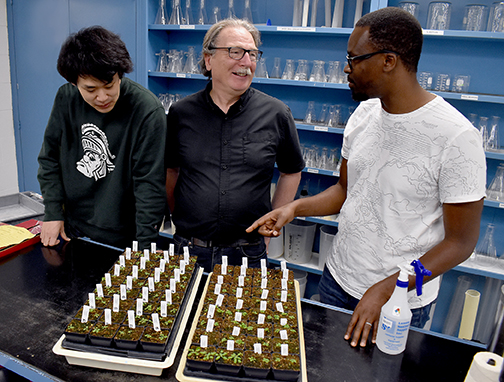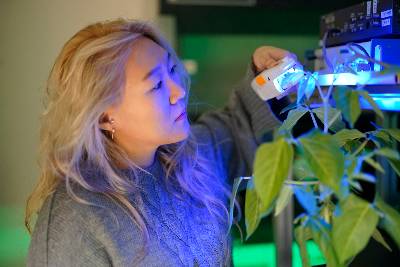Unlocking solar-powered secrets: DOE renews grant for photosynthesis research at MSU
Article Highlights
- The U.S. Department of Energy has awarded the MSU-DOE Plant Research Laboratory a $12M competitive renewal grant to continue research in photosynthetic energy capture, conversion and storage.
-
The grant covers three main research focuses:
- Photosynthesis in real environments
- Optimizing photosynthetic productivity with subcellular and cellular modules
- The chloroplast in the cellular context
The U.S. Department of Energy has awarded the Michigan State University-Department of Energy (MSU-DOE) Plant Research Laboratory (PRL) a $12 million DOE Office of Basic Energy Sciences competitive renewal grant to continue research in photosynthetic energy capture, conversion and storage.
The three-year grant (2023-2026) will allow PRL scientists to continue in their mission to understand how photosynthetic organisms function and thrive in natural environments. Those detailed mechanistic discoveries will enable the development of new technologies that improve human lives.
“This renewal from the Department of Energy is a testament to the PRL’s almost 60-year history of plant science research excellence,” said Doug Gage, vice president for research and innovation. “The current PRL team is committed to continuing that legacy with new scholarship that could lead to fundamental insights with important applications. I congratulate the team on their renewal and wish them continued success.”

MSU undergraduate Sam Hu (left), Christoph Benning (center) and postdoc Yosia Mugume discuss mutant Arabidopsis thaliana plants Mugume grows for lab experiments. Credit: Kara Headley
Currently, 11 PRL faculty members, as well as talented postdocs, technicians and graduate and undergraduate students, participate in this endeavor, covering a comprehensive spectrum of expertise in molecular, synthetic, structural and cell biology, biophysics, biochemistry, molecular dynamics modeling, plant, algal, and microbial physiology, genomics and genetics.
The grant covers three main research focuses:
- Photosynthesis in real environments: Photosynthesis provides nearly all the energy in our ecosystem, and all agriculture. The researchers are looking to understand how photosynthetic reactions and machinery operate in real, dynamic environments to ultimately improve the productivity of crop plants.
- Optimizing photosynthetic productivity with subcellular and cellular modules: Photosynthesis is a modular process, with lots of parts interacting and working to create this system. Understanding the different levels of modularity will open the door to engineering improvements that enhance photosynthesis.
- The chloroplast in the cellular context: Photosynthesis requires the coordination of many different cellular processes simultaneously. Researchers focus on a variety of ways in which the chloroplast communicates with the rest of the cell in order to integrate processes that occur within the chloroplast to the other activities going on in the cell or even the total plant.
In November 2022, the PRL hosted a site visit for the review team, a two-day event where the PRL community came together to present research under these focuses and beyond. Faculty, postdocs and graduate students presented on the current and upcoming research happening within and collaboratively between their labs.

Donghee Hoh, a research associate in David Kramer's PRL lab, uses a MultispeQ instrument to take measurements from a cowpea plant. Credit: Kara Headley
“The renewal proposal was prepared in a continuous effort by all PRL faculty and many participating postdocs and grad students that spanned much of 2022,” said Christoph Benning, PRL director and University Distinguished Professor in the Departments of Biochemistry & Molecular Biology and Plant Biology. “The collaborative spirit during the process was highly gratifying and fostered synergistic activities among diverse members of the PRL with different expertise. This will allow us to solve basic questions related to light capture and conversion into chemical energy and cellular building blocks by photosynthetic organisms.
“The PRL provides a unique setting recognized by DOE to address difficult problems in plant biology which would otherwise be even harder to solve,” Benning added. “We can all be proud of this effort and the opportunities that arise for the PRL scientific community and beyond due to the renewal of this grant.”
Established in 1965, the MSU-DOE Plant Research Laboratory is a joint venture between the U.S. Department of Energy, Division of Chemical Sciences, Geosciences, and Biosciences, Office of Basic Energy Sciences (DOE-BES); and Michigan State University.
Banner image: The U.S. Department of Energy has awarded the Michigan State University-Department of Energy (MSU-DOE) Plant Research Laboratory (PRL) a $12 million DOE Office of Basic Energy Sciences competitive renewal grant to continue research in photosynthetic energy capture, conversion and storage.